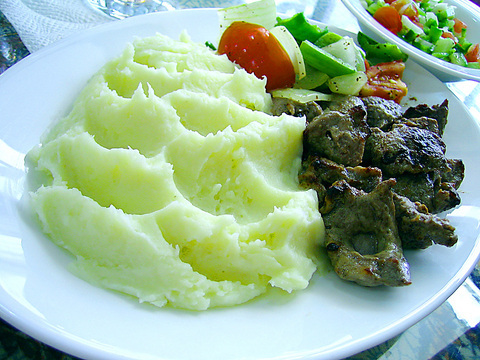Persian merchants settled in China as early as the Han dynasty and brought their goods, culture and food with them. The merchants never made it across the Strait, however, and to this day Taiwan lacks (except for the occasional Persian cat or rug) any sign of the ancient culture.
Iranian businessman Peter Amni is trying to change all that with his new restaurant, Persian Heaven.
Opened a little over two months ago near the intersection of Minsheng and Longjiang Roads, Persian Heaven is the first restaurant in Taiwan to offer exclusively Persian cuisine. While Amni is busy most of the time running his other business at the World Trade Center, his two sons and several cooks hired specially from Iran welcome new and curious diners to their restaurant every day.

PHOTO: MEREDITH DODGE, TAIPEI TIMES
Most customers opt for one of the many kebabs on offer, which include steak, minced beef, lamb and chicken, and come in mild, spicy and saffron flavors. The kebabs are joined by a pile of juicy barbecued veggies -- tomatoes, onions, bell peppers and mushrooms -- and a mound of either Persian rice or mashed potatoes. The creamy mashed potatoes are highly recommended as the perfect starchy complement to the flavorful barbecued items.
Diners interested in tasting authentic Persian food can choose from a variety of meat stews such as the ghormeh sabzi, chunks of beef or lamb and beans in a soup of spinach, parsley, coriander and other herbs. The stews tend to be heavy, so if you go for lunch on a hot day, it may be a good idea to opt for the kebab instead.
Any of the plates can become a set meal with beverage, soup and salad by adding NT$60. The plates themselves are satisfying enough, but if you're really that hungry, order another dish or a dessert -- the creamy, watery soup, made with mint, is a dud, and the salad, with an abundance of finely chopped bell peppers and onions, is more like a salsa.
Dessert, however, should not be omitted at Persian Heaven. The puddings are like a chewier, stickier version of French custard. The baked pudding and rice pudding are themselves worth a visit to the restaurant.
The decor represents Persian culture in the same way Chinese restaurants in the West represent Chinese culture. While the ornately patterned tablecloths, replicas of ancient Persian busts and Iran tourism posters may be a little over-obvious, they're not tacky, and the Farsi music playing in the background really livens up the place. If you're even mildly interested in Middle Eastern food and culture, don't miss Persian Heaven.

June 23 to June 29 After capturing the walled city of Hsinchu on June 22, 1895, the Japanese hoped to quickly push south and seize control of Taiwan’s entire west coast — but their advance was stalled for more than a month. Not only did local Hakka fighters continue to cause them headaches, resistance forces even attempted to retake the city three times. “We had planned to occupy Anping (Tainan) and Takao (Kaohsiung) as soon as possible, but ever since we took Hsinchu, nearby bandits proclaiming to be ‘righteous people’ (義民) have been destroying train tracks and electrical cables, and gathering in villages

Dr. Y. Tony Yang, Associate Dean of Health Policy and Population Science at George Washington University, argued last week in a piece for the Taipei Times about former president Ma Ying-jeou (馬英九) leading a student delegation to the People’s Republic of China (PRC) that, “The real question is not whether Ma’s visit helps or hurts Taiwan — it is why Taiwan lacks a sophisticated, multi-track approach to one of the most complex geopolitical relationships in the world” (“Ma’s Visit, DPP’s Blind Spot,” June 18, page 8). Yang contends that the Democratic Progressive Party (DPP) has a blind spot: “By treating any

Swooping low over the banks of a Nile River tributary, an aid flight run by retired American military officers released a stream of food-stuffed sacks over a town emptied by fighting in South Sudan, a country wracked by conflict. Last week’s air drop was the latest in a controversial development — private contracting firms led by former US intelligence officers and military veterans delivering aid to some of the world’s deadliest conflict zones, in operations organized with governments that are combatants in the conflicts. The moves are roiling the global aid community, which warns of a more militarized, politicized and profit-seeking trend

This year will go down in the history books. Taiwan faces enormous turmoil and uncertainty in the coming months. Which political parties are in a good position to handle big changes? All of the main parties are beset with challenges. Taking stock, this column examined the Taiwan People’s Party (TPP) (“Huang Kuo-chang’s choking the life out of the TPP,” May 28, page 12), the Democratic Progressive Party (DPP) (“Challenges amid choppy waters for the DPP,” June 14, page 12) and the Chinese Nationalist Party (KMT) (“KMT struggles to seize opportunities as ‘interesting times’ loom,” June 20, page 11). Times like these can